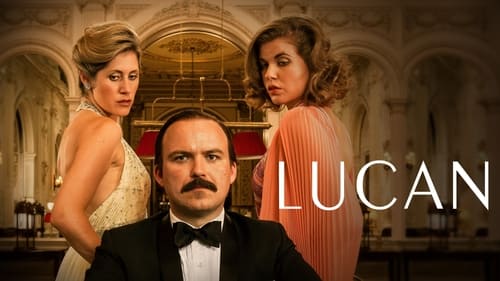Protraph
Lack of good storyline.
WillSushyMedia
This movie was so-so. It had it's moments, but wasn't the greatest.
Ketrivie
It isn't all that great, actually. Really cheesy and very predicable of how certain scenes are gonna turn play out. However, I guess that's the charm of it all, because I would consider this one of my guilty pleasures.
altereggonyc
There's a lot of detail omitted from this two-part melodrama. Given its length, I would have thought it would have packed in more. Lord Lucan's colorful background and activities before this incident are omitted, so this becomes just a simple story of how a compulsive gambler, after a bitter divorce, plotted against his wife. But for the stately homes and tuxedos, it's a Lifetime movie about a woman in an abusive relationship.The crime itself was not that complex, and the theories about what may have happened fairly obvious and not very numerous, so I'm not sure why they had to drag this out for as long as they did. I appreciate their faithfulness to the materials, but if they weren't going to do more with them, they could have at least made the film shorter. The acting is excellent, and the posh British interiors include some great upholstery, but I'm not sure this is a good investment of movie-watching time. You could spend five minutes reading about Lord Lucan online and then pick a different film.
jc-osms
I was around 13 when the story of the disappearance of suspected, later convicted, murderer Lord Lucan broke and have quite strong memories of the publicity of the day. Indeed in a "Where's Wally" kind of way, he became almost a figure of fun, as he escaped detection then as now, despite many false trails and red herrings ever since.Therefore, although criticised by representatives of both viewpoints, for and against the Lord, for its interpretation of the events of the night of the family nanny Sandra Rivets' brutal murder and the subsequent events, at least this two-part TV drama doesn't sit on the fence on the question of Lucan's culpability. As presented here, we get a mostly plausible sequence of events, including the startling but questionable conclusion that Lucan's society friends had him killed off before he could return to defend himself and attempt to fight for the custody of his children.The drama goes into details on the events leading up to the night of the murder highlighting Lucan's relationship with his upper-class, snobbish society friends, with it his addiction to gambling (hence his ironic nickname "Lucky" Lucan) and the breakdown of his marriage. He's presented as a weak-minded, out-of-control gambler, a mother's boy and eventually a ruthless husband, shamefully trying to have his long-suffering but still sane wife committed to a psychiatric hospital against her wishes.I found the first part of the drama leading up to the murder more gripping than the aftermath conveyed in part two, perhaps instinctively due to the latter's lack of conviction as to how events supposedly turned out. I also didn't really like the "Citizen Kane" device of framing the story with a writer's retrospective investigation, recreating imaginary present-day interviews with key characters recollecting the past events.The acting I found of a mixed quality too. Rory Kinnear for one thing doesn't seem tall enough in the part and fails to convince he's a bored aristocrat while you can hear Christopher Ecclestone put on his posh accent every time he speaks as Lucan's so-called friend and adviser John "Aspers" Aspinall.Nevertheless the programme did work for me as a study of the idle rich with all their inherent class snobbery and blind loyalty to one another, but in concentrating on the Lucans and their rich in-crowd, it could be said to have been denigrating to the memory of the lowly commoner who was unlucky enough to fall into their orbit, although it tries to exonerate itself on that score with a brief scene giving the dead girl's parents the right of reply.The Lucan mystery may never be solved and while I didn't fully believe this reconstruction of what happened after his disappearance, it is undeniably a story worth telling, particularly in the commendably sober and straightforward manner as here.
l_rawjalaurence
Based on the work of the journalist John Pearson, LUCAN tells the story of the murders committed by Lord ("Lucky") Lucan (Rory Pearson), as well as explaining his subsequent disappearance. Adriam Shergold's production portrays Lucan as a perpetual loser, someone trying to live up to his aristocratic image yet perpetually humiliated - often consciously so - by his close friend, the tiger-loving John Aspinall (Christopher Eccleston). Following repeated fruitless attempts to obtain custody of his children, Lucan resolves to murder his wife (Catherine McCormack), but even that simple deed goes wrong for him. LUCAN portrays an aristocratic world that, even by the mid-1970s, was an anachronism; no one should automatically expect privileged treatment, whatever their background. Lucan is simply part of that world - as portrayed by Rory Kinnear, he maintains a British stiff upper-lip (it would be bad form to show one's emotions), but we can see how his lack of success affects him. The narrative unfolds in leisurely fashion, giving plenty of opportunity for the distinguished cast to show off their acting paces. Paul Freeman, Michael Gambon, Gemma Jones and Jane Lapotaire all have the chance to shine in various roles. Although LUCAN portrays a thoroughly unsympathetic character inhabiting a world of leisured privilege - where gambling is considered a 'profession' rather than an illness - we can nonetheless understand the motives behind his actions.






